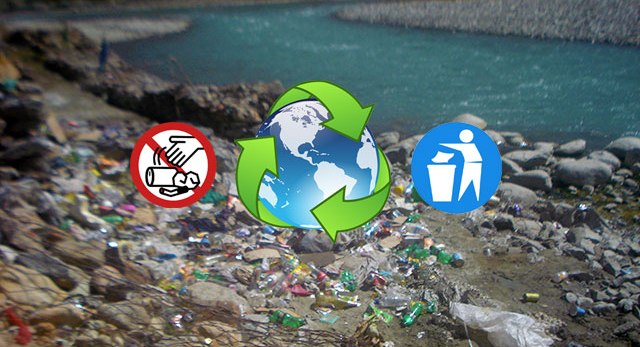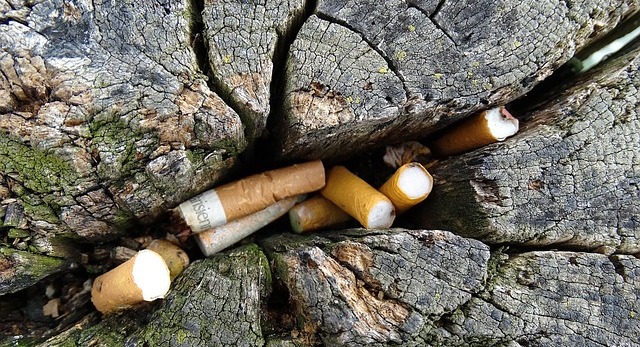Tips to travel clean and not dirty the places you visit

We have taken up the initiative of keeping it clean while travelling by not littering and urge you to do the same. Here are some tips to help you keep clean the places you visit by not littering and by properly disposing your trash.

Litter has grave effects on the environment as well as on all the living. It is very easy not to litter and properly dispose trash. Yet a lot of people act like it is a burden, out of pure apathy and ignorance. Don’t be one of them. In many tourist spots there will be a trash can or a “use me” trash bin. Look for that and throw it in.
In case you are at a place with no trash bins, then here are some simple tips for keeping things clean and green while travelling and properly disposing your waste.
Always keep trash bags
These can be plastic bags, cloth bags or even paper bags. In many places, cities, states and countries plastic bags are prohibited and banned either partly or completely [1], mainly for their impact on the environment. For example, recently in Karnataka plastic bags were completely banned [2]. In such cases you can buy some cloth bags and easily include them along with your travel luggage.
You may reuse the plastic bags that came with packaging of something you bought in case you don’t have any other option. However in some places you are liable to be heavily fined if found in possession of plastic bags.
Also take some old newspapers you don’t need any more. You can use them to wrap up trash and then keep in the trash bag, and they also come in handy for other purposes such as wrapping extra shoes to be kept in your bag.

Collect your own trash and dispose it properly
Whether you are having fun in a beach or a trek through the jungle or the mountains, a nice picnic amidst Mother Nature, or even while travelling in a vehicle - this applies to all: Collect your trash and ensure proper disposal. The solution is three simple steps:
- Take some trash bags and covers along.
- Collect your trash in these bags.
- Dispose them off in the nearest proper disposal opportunity.

In populated areas, cities and towns, you can easily dispose thrash. But in case you are wandering into nature, an isolated beach, on a trek or into the wilderness etc., where there are no “use me” trash cans, thrash boxes or waste collectors, it is your responsibility to take care of your trash and properly dispose it. In case you have a vehicle or a cab you can take it along easily until you find a proper trash disposal option, or else bus stops or hotels will have “use me” trash cans.
Biologically degradable waste like banana peels cause no harm to nature, but not chips packets, plastic or other synthetic food packages, chocolate wrappers, along with plastic water bottles etc., which can all be called as synthetic trash. Use your trash bags to collect these synthetic trashes you generate, and take them back with you where you can properly dispose them off.
However throwing a lot of biologically degradable thrash isn’t okay too! How would you like to see rotten food leftovers, smelly peels all around when you visit a place to take a deep natural breath of fresh air? Not nice, so try not to litter those too and ensure that you dispose them off properly. If there are trees or plants around, biological wastes like fruit peels may be useful to them as compost or to hold ground moisture, but just make sure you aren't outright dirtying the place.
Furthermore, carelessly disposing food is strongly not recommended in places with wildlife, as wild animals may get attracted to disposed food, leading to endangering campers or hikers.

Even in case you are taking food parcels, do not throw the plastic or paper used to wrap the food. Wrap these wastes in your old newspapers and put them in your trash bag. Remember the reason you visited was to enjoy the beautiful bliss of natural surroundings, and make sure it stays so, without ugly thrash lying around.
Don’t act like they will be a burden for you to carry back! They were not a burden when you carried them all the way into the wilderness. You can easily carry them back in the trash bags in your backpacks.
The important thing to remember is to take things as less as possible so that you would have lesser thrash to take back for disposal. For fellow Indians, don’t bring that sambar (curry) filled in a plastic bag that typically eateries provide! If you want to get curry, keep a good tiffin carrier.

Bottles and beverage cans
Water is highly essential for your well being, and you need to carry pure drinking water while travelling. In case you take disposable plastic water bottles, or any other plastic bottles like soft drink etc., do not just throw them away or litter as you please, but crumple them and add them along with other synthetic trash in your trash bag.
You can also keep a couple of light weight metal water cans or reusable food grade plastic cans in which you can pre-fill water from the purchased purified drinking water or mineral water. Lightweight metal beverage cans like soft drink cans can be easily crumpled and wrapped in old newspapers and included in your trash bag.
The plastic menace is real. According to a December 2014 study, the estimated quantity of plastic floating in the ocean is nearly 270,000 tonnes (this is excluding the quantity of plastic waste under the ocean waters), which is only a fraction of the total plastic waste that finds its way into the oceans.[3]
We haven't even mentioned about the millions of tonnes embedded on the land yet! So, keep these in mind before you are about to randomly throw away a plastic bottle. Instead, properly dispose your plastic and other trash and help the earth's environment in which you yourself live.

Avoid littering cigarette butts
Let us make one point clear that we do not endorse smoking, nor promote it. In fact we highly recommend not getting into this addictive habit that causes cancer. Saying that, we also know that there are still a lot of people addicted to smoking, whether the “chain smokers” or the “social smokers”.
If you are one of these, and simply can’t resist having a puff amidst the serene nature, then at least do make sure you don’t throw the cigarette butt on the ground after smoking. This constitutes littering. Same goes for beedi fellows and other kind of smokers.

Cigarette butts are in fact toxic! And your littering will cause toxic waste. Cigarette filters are the single most collected item in international beach cleanups each year.[4]
Here is a small trick you can use : Gently tap the cigarette butt until the remaining burning tobacco piece falls off. Extinguish this fallen piece properly so that it no longer burns. Make sure the remaining butt – that is the filter portion in your hand is not burning. Now you can safely add this butt to your trash bag. One more tip: wrap your cigarette butts in your old newspaper piece and crumple it. That way the stink from the butts will be greatly minimised.

Finally, it is very easy being a litter free traveller. We know there are a lot of uneducated and even lazy educated imbeciles, and that we are far from having a litter free environment. But we are of those that have determined not to litter. Are you?
Hope these few tips inspire you to be a responsible traveller. If there is anything you want to add, feel free to comment below.
Travel clean and travel green. Happy travelling! :)
References:[2] Total plastic ban in Karnataka - From Times of India
[3] The menace of plastic waste - The Hindu, Editorial, February 17, 2015 00:31 IST, UPDATED: June 24, 2016 12:55 IST
[4] Cigarettes Butts and the Case for an Environmental Policy on Hazardous Cigarette Waste - Int. J. Environ. Res. Public Health 2009, 6(5), 1691-1705; doi:10.3390/ijerph6051691

